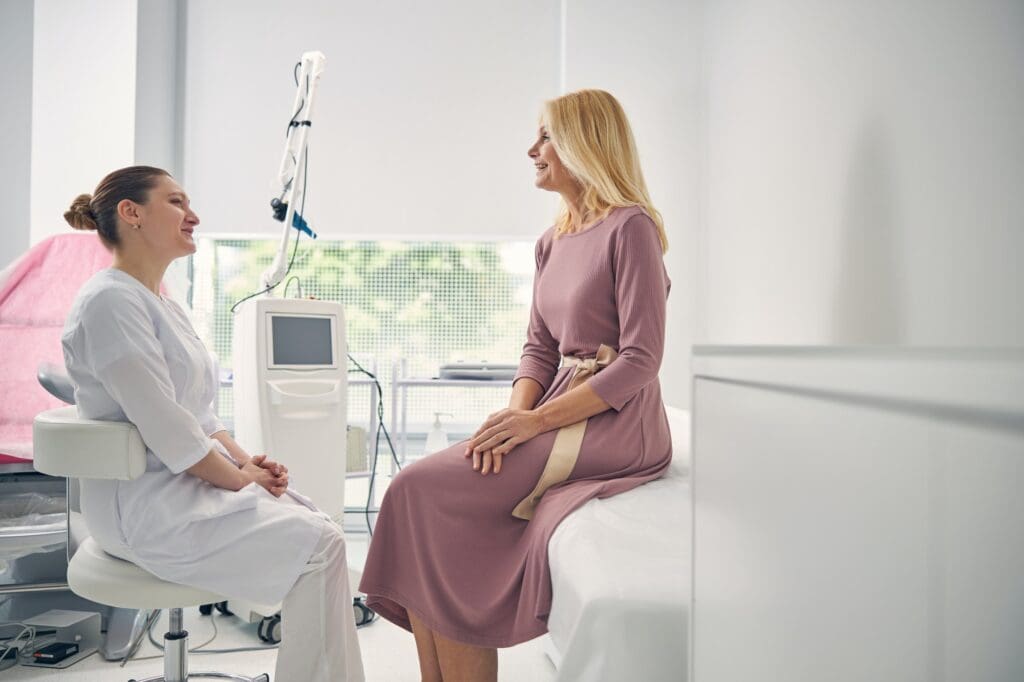
FAQ – Gynecology
Which hald of the cycle should I reister for cancer screening?
The most ideal period for examination and cancer screening is two weeks after menstruation.
Can I use any vaginal cup before the examination?
In the days before the test (2-3 days), especially in case of sampling, it is not recommended to use any suppositories.
How frequently is it recommended to go for a gynecological screening?
Based on the valid domestic professional recommendations, annual gynecological screening is recommended if there are no complaints.
What does ovulation mean?
Ovulation (also known as ovulation) means the process when, during the menstrual cycle, as a result of hormonal changes, one (more rarely, more) egg is released from the ovary. This usually happens between two periods, more precisely 12-16 days before the start of the next period.
When should I see a doctor if my period is late?
Basically, it can happen in certain periods that our menstruation is delayed or missed, for which there are many reasons, but it is important to decipher the cause of the problem and solve the problem in every case.
One of the most common and well-known reasons for missed periods is pregnancy. In such cases, it is worth taking a pregnancy test from the 14th day after conditional conception, preferably from the first urine in the morning, because the increase in the level of the HCG hormone can already be experienced by this time. In the case of a positive test, we cannot be 100% sure of pregnancy, because the fact of pregnancy will be clearly established by the obstetrician-gynecologist during the ultrasound examination.
Pozitív teszt esetén még nem lehetünk 100%-ig biztosak a terhességben, ugyanis a terhesség tényét a szülész-nőgyógyász szakorvos fogja az ultrahangvizsgálat során egyértelműen megállapítani.
If the pregnancy test is negative and the menses still haven't come, you don't need to consult a gynecologist immediately, because even momentary stress, insomnia, or a mild infectious disease can be the cause of the problem, which is often solved by lifestyle changes or after recovery from the disease and the menstrual cycle is restored. If the problem persists, or if the previously listed causes can be clearly ruled out, it is worth consulting a specialist so that the fact of more serious diseases can be ruled out, or in the case of a more serious disease, treatment can begin as soon as possible.
Amennyiben a probléma továbbra is fennáll, vagy a korábban felsorolt okok egyértelműen kizárhatók, érdemes szakorvoshoz fordulni, hogy a komolyabb betegségek ténye kizárható legyen, vagy komolyabb betegség esetén minél előbb elkezdődhessen a kezelés, gyógyítás.
Is it necessary to take medication for HPV infection?
In the case of HPV infection, our treating physician can determine whether we need to take medication. In addition to the Gardasil vaccine, Dr. Kia recommends supporting and strengthening the immune system in case of HPV infection, as well as a personalized control examination in all cases.
How often should you go for an HPV screening?
In general, the first HPV screening is recommended 3-5 years after the first sexual intercourse. If the HPV test is also negative along with the cancer screening test, it is enough to go for the HPV screening every 3 years.
As a person affected by HPV infection, as well as in the case of family involvement, it is necessary to attend control appointments customized by the treating doctor, which can be up to half a year, 1 year, etc.
How often should you go for STD screening?
STD (Sexually Transmitted Diseases) means sexually transmitted diseases in Hungarian. In Hungary, there is currently no protocol on how often STD screening should be performed. Basically, in case of gynecological complaints, it is definitely worth going for an STD screening (e.g. severe lower abdominal pain, vaginal pain, etc.).
How often is it necessary to go for cancer screening?
The purpose of cervical screening is to prevent cervical cancer, to detect and treat the disease even in the absence of complaints, in order to prevent possible later, more serious consequences.
Cervical cancer examination cannot be planned for days of bleeding, the most optimal time is the period between 10-20 days from the first day of the cycle.
In general, according to the Hungarian decree, regular cancer screening is recommended for women over the age of 25 or after the first sexual intercourse.
If the result of the cancer screening is negative, it is recommended to repeat the test every year, if the cancer screening was performed together with the HPV test and the result is negative, then it is enough to perform a control test every 2 years.
However, it is worth knowing that the control tests can be different even in case of negative results (they are individualized depending on the medical history of the given lady).
What are the most important gynecological screenings for women? How often should they be done?
The most important gynecological screenings include cervical cancer screening and HPV screening. In addition, it is only necessary to go for further screenings based on the recommendation of our gynecologist. If the result of the STD (sexually transmitted diseases) screening is positive, it is worth performing the ureaplasma test as well, because most often in this case the result of the ureaplasma screening will also be positive. In this case, our patients receive the treatment determined by the specialist, and after a few months, based on the control examination, it is decided whether further treatment is necessary, or whether the previous treatment achieved the desired effect and the test result is already negative, so the patient is healthy.
In the case of HPV screening, similarly to STD screening, if the result is positive, the Patient will receive the treatment determined by the specialist, however, depending on the result, loop conization or various interventions may be considered.
In the case of gynecological cancer screening, if the result is positive and there is a sign of HPV, the next thing to do is HPV typing, and after that, in case of positivity, the previously described loop conization, punch biopsy, or other surgical interventions can be considered in order to cure the disease
What does mammography mean? How often necessary to have a mammography examination?
In Hungary, breast cancer ranks first among gynecological cancers. A large number of cancers can be prevented or cured by early detection of the disease, which is based on regular screening tests. The first step in prevention is self-examination, which is followed by breast ultrasound and mammography, which is an X-ray examination of the breasts.
In Hungary, if there was no previous family history of a similar disease, it is recommended (based on medical history) to repeat the tests listed above every year or every two years from the age of 45.
Magyarországon, amennyiben korábban a családban nem volt hasonló betegség 45 éves kortól ajánlott (kórelőzmény alapján) évente / kétévente megismételni a fent felsorolt vizsgálatokat.
It is important to know that the breast examination is not performed by the gynecologist, he only indicates when the examinations are recommended for the given Patient. It is necessary to apply for a mammography examination at the regionally competent ambulance.
